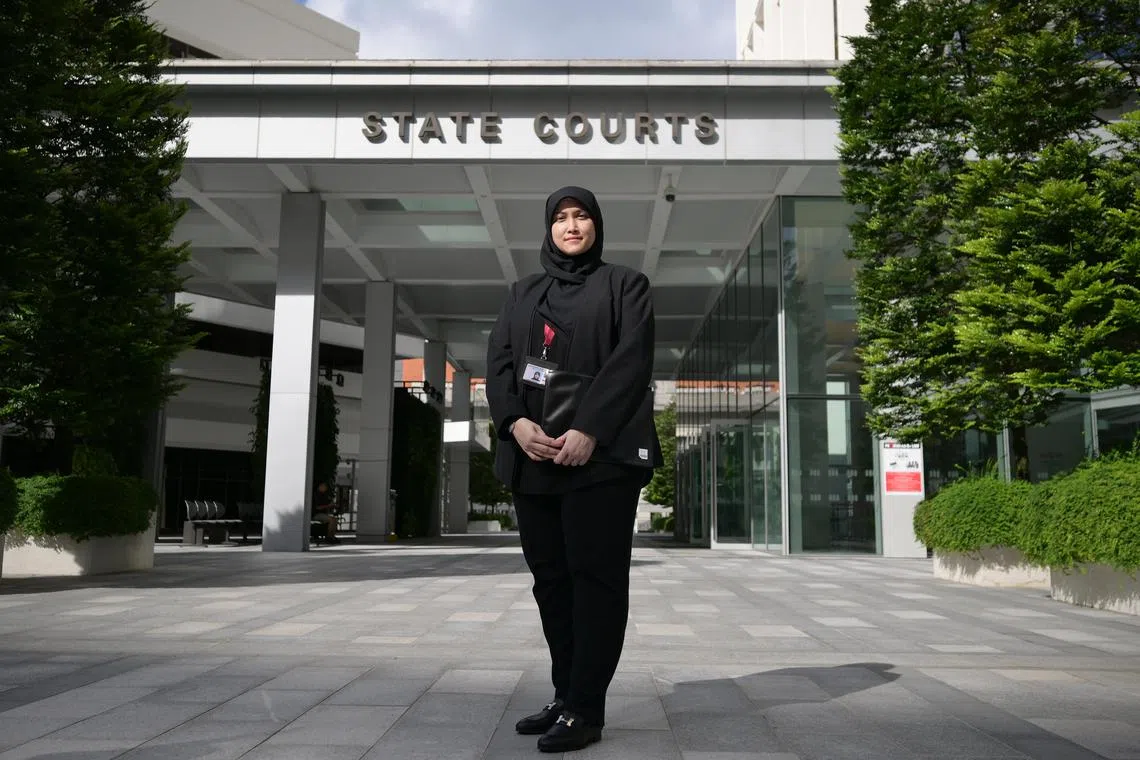More trained to help those with special needs through police interviews, court and prison processes
Sign up now: Get ST's newsletters delivered to your inbox

Ms Nurhafidzah Mohamed Kamal, a senior court social worker in the State Courts' Centre for Specialist Services, once helped an offender with intellectual disability who could not speak.
ST PHOTO: NG SOR LUAN
SINGAPORE – When people with special needs break the law, their anxiety may be even more pronounced as they go through police interviews, court hearings and prison stints.
To address this, more people have been trained to help those with special needs navigate the criminal justice system.
The Appropriate Adult Scheme for Persons with Mental Disabilities had 90 volunteers in 2016 when Minds – then known as the Movement for the Intellectually Disabled of Singapore – was appointed to run it.
It now has more than 360 volunteers as at December 2024.
Appropriate Adults (AAs) are volunteers trained to assist those with intellectual disabilities, autism or mental health issues through interviews with the authorities, by facilitating effective communication and providing emotional support.
Retiree Madan Mohan Singh, 72, an AA with 12 years’ experience, said suspects usually feel scared and intimidated during police interviews.
Mr Singh sets them at ease by introducing himself as their “buddy”.
He said: “They need somebody whom they can trust, (in order) to be open.”
Madam Kng Kim Eng, 60, a part-time technology consultant who has been an AA for six years, once helped a woman with intellectual disability during a police interview. The woman became emotional as she did not understand why she was accused of being a money mule.
Madam Kng explained that although she did not transfer money to anyone, it was an offence to give others access to her bank account, which was used illegally.
The interview proceeded after the woman calmed down.
Madam Kng said: “We should not interfere with the interview, but we have to look out for signs the suspect is feeling stressed.”
A police spokeswoman said AAs are activated for cases where investigation officers assess that the person has special needs or mental health issues, except in instances where there are extenuating circumstances.
This may be when urgent interviews are needed to prevent the disposal of evidence or another crime from being committed.
She added that the authorities will notify caregivers of the arrest and investigation of special needs suspects, and invite caregivers to provide more information about the suspect’s medical condition.
In court, judges, court officers and interpreters use simple English when communicating with people with special needs. The pace of court proceedings is adjusted so they can follow.
A Singapore Courts spokesperson said such individuals are often referred to the State Courts Centre for Specialist Services (CSS), a team of psychologists, counsellors and social workers.
The team may conduct a community court conference to understand the underlying causes of offending behaviour, and refer them to other social service agencies.
Ms Nurhafidzah Mohamed Kamal, a senior court social worker in CSS, once helped an offender with intellectual disability who had difficulties expressing himself. She printed icons related to daily living activities like household chores and various emotions, so that he could point to them as they conversed.
Said Ms Nurhafidzah: “At least he could contribute when I asked him questions like, ‘What did you do today?’ and ‘How do you feel?’”
The Singapore Prison Service (SPS) said all prison officers are trained to engage inmates with intellectual disabilities or autism.
Since 2022, SPS has worked with Minds to provide training for officers in areas like communication and behaviour management.
Correctional unit officer Mahad Ridzuan Mohd Zin, who has worked in Changi Prison’s Psychiatric Correctional Unit (PCU) for about nine years, manages such inmates.
In an e-mail interview, he said these inmates could be housed in cells of one, four or up to eight people, based on their medical needs, and safety and security risks.
Those with special needs whose conditions are more stable are housed with the general inmate population.
Those who need specialised treatment will go to the PCU, where SPS engages the Institute of Mental Health to conduct psychiatric treatment programmes, including therapy and counselling.
Mr Mahad said one challenge is engaging inmates who have adjustment issues, such as difficulties with being separated from their caregivers.
He said: “I will engage them more frequently to better support them.”
Ms Nurhafidzah said that for offenders with special needs, their cognitive abilities require specialised intervention.
She said: “In my eyes, they are like any other offender who needs help.”
Christine Tan is a journalist at The Straits Times reporting on crime, justice and social issues in Singapore.



